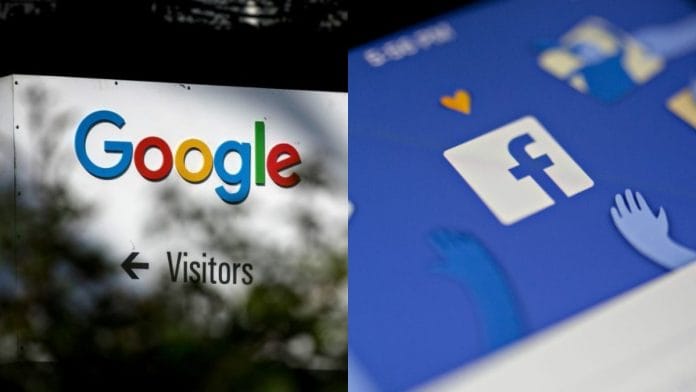Mark Zuckerberg, Sundar Pichai and Jack Dorsey will visit with Congress today, as each has multiple times since last October, to testify about the spread of misinformation (gossip, mistakes and lies) and disinformation (propaganda) across digital platforms controlled by the companies they run.
They are likely to repeat many of the things they’ve said before.
Zuckerberg, the chief executive officer of Facebook Inc., plans to say he has “made fighting misinformation and providing people with authoritative information a priority for the company.” In October, he testified that “people want to know that companies are taking responsibility for combatting harmful content” and “want to make sure that platforms are held accountable.”
Pichai, the CEO of Google parent Alphabet Inc., will say that his core mission is “providing trustworthy content and opportunities for free expression across our platforms, while limiting the reach of harmful misinformation.” In October, he told Congress that his company has “a responsibility to protect people who use our products from harmful content and to be transparent about how we do that.”
Dorsey, the CEO of Twitter Inc., will say that “Twitter’s purpose is to serve the public conversation,” and his company’s effort to “combat misinformation” has to be “linked to earning trust.” In October, he told legislators that “Twitter’s purpose is to serve the public conversation” and that people “want to be able to trust the services they are using.”
So, Groundhog Day.
And how much has truly changed over the past several months on social media and the web since the last time this trio testified? Many crazy things— seismically destructive things — keep popping up. The recent antipathy toward social media that began with concerns about Russian disinformation undermining the 2016 election and Donald Trump savaging democracy and basic decency has grown because of equally reasonable concerns about how the web gave wings to Trump’s debunked myths about election fraud, the insurrection at the Capitol on Jan. 6 and hooligans floating anti-vaccination hogwash amid a pandemic.
Sitting here as an unscientific observer who admires the myriad virtues of the internet and is pained by the chaos and bile it so easily sponsors, things don’t seem that much better now than they were months ago.
Zuckerberg, Pichai and Dorsey will all make strong cases for the billions of posts they monitor and the millions they take down. They will make equally robust arguments for the sophisticated and high-minded monitoring systems they put in place. Their respect for privacy and free speech will also shine through.
Yet time and again, social media unleashes one kraken after another despite all of those good intentions and despite the dog-and-pony shows Congress hosts.
Also read: Facebook’s internal guidelines let users ‘call for death of public figures’: Guardian report
Internet industry stars like Zuckerberg, Pichai and Dorsey are showing up for today’s hearing before the House Committee on Energy and Commerce because legislators are interested in tearing up their business models, and they’re understandably concerned that Congress might gut Section 230 of the Communications Decency Act of 1996.
That act began as an effort to regulate the dissemination of pornography on the web, which the Supreme Court later overturned. But Section 230 held, ensuring that “no provider or user of an interactive computer service shall be treated as the publisher or speaker of any information provided by another information content provider.” In other words, digital service providers couldn’t be held liable for problems that arose from hosting other parties’ content.
Section 230 has allowed the web to flourish. Fearless, innovative and free-flowing blogs, user reviews, videos and information services have multiplied because the platforms hosting them were insulated from nettlesome lawsuits. Facebook, Google and Twitter all enjoy the same protection, and they see it as a foundational reason for their success.
But Section 230’s authors certainly didn’t foresee social media or envision its global growth and influence in 1996. And the largest digital players have argued that they’re mere technology “platforms” rather than “publishers” to preserve the shield Section 230 provides them. This has helped stave off regulation and spared them the expense of complying with the corporate and social responsibilities that come with it.
None of this would be in play right now if the big technology companies had done a better job of self-regulating. Yes, the digital giants have helped foster the democratization of information and communication. Left, quite literally, to their own devices, they’ve also helped society unspool and polarization to proliferate.
Roger McNamee, writing in Wired this week, suggests that the threat of felony prosecutions or securities fraud investigations might be the medicine Silicon Valley needs to become more deeply proactive. If Zuckerberg, Pichai and Dorsey want to follow a gentler path, they could give up the charade of claiming that they’re only overseeing digital machines, acknowledge that they’re publishers and accept the consequences and burdens of running their businesses as such. They’ve all also said they’re concerned that dumping Section 230 would hurt smaller companies more than them. That may be true, which makes the case for updating Section 230 so that smaller enterprises remain protected while larger, more influential companies are regulated more closely and penalized more harshly.
Zuckerberg, who has gone out of his way in the past to keep his business humming along by ignoring the abuses it spawns, plans to tell Congress today that he’s open to modifying Section 230 along those lines. Liability protection for posting “unlawful content,” he’ll say, should be predicated on “companies’ ability to meet best practices to combat the spread.” To that end, instead of being granted blanket legal immunity, “platforms should be required to demonstrate that they have systems in place for identifying unlawful content and removing it.”
However this plays out, let’s not hold another congressional hearing about it. Let’s see some action. – Bloomberg
Also read: Facebook reaches deal with Rupert Murdoch’s News Corp, agrees to pay for content in Australia






